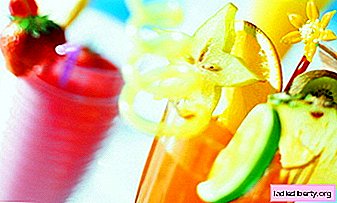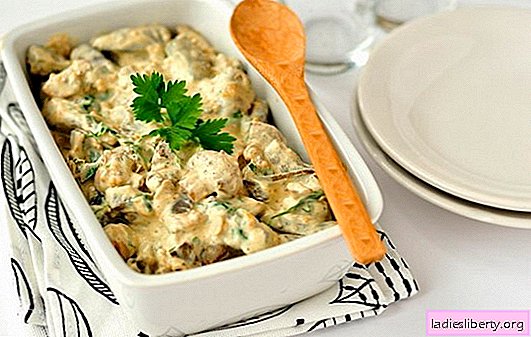
Many people believe that spicy herbs can only be used in cooking in order to give the dish a special taste and aroma. This is a big mistake.
Coriander, whose beneficial properties are not known to everyone, favorably affects the work of all internal systems of the body.
Spice is very popular among residents of the East and China. Surprisingly, coriander is used there to make love potions.
Many people believe that spice extends life.
Will coriander be useful to everyone? There are contraindications to use, like any other product. In order to avoid unpleasant consequences, you need to familiarize yourself with them.
Energy value and composition of spice
Coriander is recommended to be added to food to people who are overweight. It is known that spice triggers metabolic processes and accelerates the process of fat burning. In addition, per 100 grams of green leaves accounted for 23 Kcal.
The composition of coriander includes:
• trace elements - phosphorus, calcium, potassium, sodium, magnesium;
• vitamins - A, B (1, 2, 4, 5, 6, 9), E, K, C, PP;
• macrocells - zinc, manganese, iron, selenium, copper.
It has been proven that coriander contains the most vitamins than other spices. In addition, per 100 grams of green leaves account for 27 mg of vitamin C - this is more than in lemon.
Coriander: beneficial properties of oil, seeds and fruits
Coriander is a real treasure with beneficial substances. In medicine and cooking, not only the green leaves of the plant are used, but also its fruits. Essential oil is also made based on spices.
Coriander: the beneficial properties of seeds
1. Seeds are very often added to medicines in order to improve their aroma and taste. They have bactericidal properties, effectively cope with colds.
2. Contribute to the improvement of cardiac and brain activity.
3. Invigorate, while helping to cope with hysteria and stress.
4. Coriander seeds allow food to be better absorbed, increase appetite.
5. Favorably affect the work of sweat glands.
6. Coriander seeds help get rid of the smell of alcohol from the oral cavity, help with a hangover.
7. Coriander is recommended to be added to food to epileptics, since the seeds prevent convulsions.
Coriander: the beneficial properties of essential oil
1. A yellowish liquid with a pleasant aroma enhances the secretion of the glands of the digestive tract.
2. Has analgesic and antihemorrhoidal properties.
3. It is characterized by antiseptic effect, added to the means for the treatment of conjunctivitis.
Coriander: the beneficial properties of fruits
1. Improve the functioning of the digestive tract.
2. Used in the treatment of diseases of a mental nature.
3. Neutralize bad breath.
4. Fruit-based infusions have expectorant properties.
5. Decoctions from coriander fruits are used as antimicrobial and painkillers.
The use of coriander in cooking and medicine
Despite the fact that coriander has quite a few contraindications, it is widely popular in medicine and cooking.
Medicinal use
1. As a choleretic agent, a decoction of coriander is prepared, dried peppermint and immortelle leaves are added there.
2. Effective broth for the treatment of prostatitis - plantain and onion seeds, parsley and carrots are added to the coriander.
3. Often infusions based on coriander with the addition of anise, celandine and St. John's wort are prescribed for gallstone disease.
4. A spice decoction with the addition of celandine and birch leaves is the best folk remedy for inflammation of the pancreas.
Other applications
1. Spice seeds are often added to special formulations that enhance male sexual function. And if you add parsley to the broth, you get an effective tool for the treatment of impotence.
2. The fruits of the plant are prescribed for hysteria. For 1 liter of dry red wine you need to add 100 grams of seeds in crushed form and insist all 3-4 days. Taking a daily drink of 100 ml (2 times a day) before meals, a person will relieve stress and get rid of depression.
3. In cooking, coriander is simply indispensable. Few people know that this plant is a part of confectionery and bakery products, pickles and marinades, alcoholic drinks.
4. The leaves of the plant (cilantro) are added to salads or soups to give the dish a special taste and aroma.
5. Massage with coriander essential oil helps relieve tension and fatigue, soothes rheumatism.
6. Often decoctions based on plants are used in cosmetology. It has been proven that coriander is characterized by whitening properties, so it effectively eliminates age spots and freckles.
The use of coriander for medicinal purposes
Each hostess should take note of several effective folk recipes based on the plant. However, first you need to study not only the beneficial properties of coriander, contraindications also need to know.
1. Prevention and treatment of diseases of the gastrointestinal tract
It is necessary to steam 1 tablespoon of coriander seeds with boiling water and insist them in a dark place for 24 hours. After this, the infusion is filtered, the remaining liquid is drunk 3 times a day, 100 ml after a meal.
2. Means against stomach ulcers
In a phyto pharmacy you need to buy sea buckthorn pulp, elecampane root and coriander fruits, everything is mixed in a convenient container in the same proportion. After that, the mixture is ground with a blender to a flour condition. The resulting "medicinal powder" is taken before meals, 1 teaspoon 2 times a day. Be sure to then drink a large glass of water - 400-500 ml.
3. The tool against freckles and pigmentation
A decoction is made from fresh coriander leaves, filtered after cooling, the remaining liquid is poured into a glass container and stored in the refrigerator. Using a cotton swab, you need to wipe your face daily with a decoction. Freckles and pigmentation will soon come down, in addition, the skin will receive nutrients and vitamins.
Coriander: contraindications and precautions
There are no gross restrictions on the use of plants in the form of spices (cooking supplement). However, there are a few buts to consider.
Coriander: contraindications
1. The daily norm is 4 grams of seeds or 35 grams of grass - you can not exceed the allowable amount. An overdose will lead to overexcitation, which is fraught with sleep disturbance, allergies or even a malfunction of the menstrual cycle in women.
2. Decoctions and infusions based on coriander are by no means applied to open wounds.
3. For women during pregnancy and during breastfeeding, the use of coriander should be reduced to a minimum, and it is better to completely exclude it from the diet.
Coriander, contraindications and beneficial properties were presented above, familiar to every housewife. This spice fills the dish with a special refined aroma that instantly arouses appetite. Knowing several useful recipes based on the plant, you can expand the scope of its application, replenish your home medicine cabinet with effective folk remedies.











